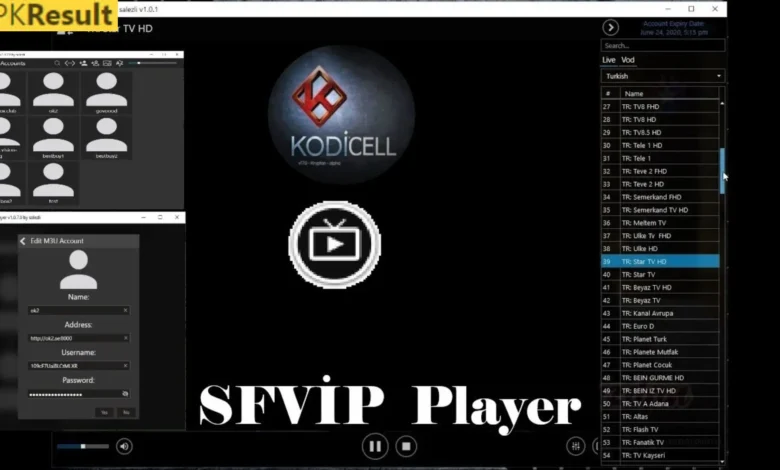How to Make SFVIP-Player Use the Proxy Route When Playing: A Comprehensive Guide

Introduction
How to Make SFVIP-Player Use the Proxy Route When Playing, The SFVIP-Player is a popular media player used for streaming IPTV content and other media sources. However, for users in regions with restricted access or for those aiming to enhance privacy, configuring SFVIP-Player to use a proxy route can improve streaming speed, bypass geo-blocks, and increase security. This guide will walk you through the steps of setting up a proxy for SFVIP-Player, explaining different proxy options, how they work, and why using a proxy can elevate your streaming experience.
StreamEast: The Ultimate Guide to Streaming Sports
Bollyflix: Everything You Need to Know
What is SFVIP-Player?
SFVIP-Player is a versatile multimedia player, primarily used for streaming IPTV content. It supports a variety of media file types and is known for its compatibility with different network protocols, making it popular among users who want to access a broad range of media sources seamlessly.
Key Features of SFVIP-Player
- IPTV Compatibility: Stream IPTV services with ease.
- User-Friendly Interface: Simple layout for easy navigation.
- Multiple Network Protocols: Supports HTTP, RTMP, and HLS streams.
Why Use a Proxy with SFVIP-Player?
A proxy server acts as an intermediary between your device and the streaming source, allowing SFVIP-Player to connect through a different IP address. This can help bypass geo-blocks in restricted regions and keep your data private, enhancing both accessibility and security.
Benefits of Proxy Routing with SFVIP-Player
- Bypassing Geo-Restrictions: Access content not available in your location.
- Improved Privacy: Mask your IP address for anonymous streaming.
- Enhanced Connection Speeds: Certain proxy servers can reduce buffering by routing through faster nodes.
Types of Proxy Options for SFVIP-Player
When setting up a proxy with SFVIP-Player, there are different types of proxy configurations to consider. The most common are HTTP proxies, SOCKS proxies, and VPNs.
HTTP Proxies
An HTTP proxy routes only HTTP traffic and is best suited for web-based streaming. However, it’s not as secure or versatile as SOCKS proxies for multimedia applications.
SOCKS Proxies
SOCKS proxies (particularly SOCKS5) handle a wider range of traffic types, making them a preferred choice for IPTV streaming and other multimedia applications. They offer better compatibility with SFVIP-Player’s network protocols.
VPN vs. Proxy for SFVIP-Player
Although a VPN provides encryption and masks your IP like a proxy, a VPN reroutes all traffic from your device. A proxy, on the other hand, is more selective, routing only SFVIP-Player’s data, which might provide better speed if configured correctly.
How to Choose the Right Proxy for SFVIP-Player
Choosing the right proxy depends on several factors, such as streaming quality, location, and budget.
Factors to Consider
- Speed and Reliability: Ensure the proxy offers stable connections to avoid buffering.
- Anonymity and Security: SOCKS proxies or VPN proxies provide a higher level of privacy.
- Free vs. Paid Proxies: Paid proxies often offer better speed and fewer ads, while free options can be slower and less reliable.
Recommended Proxy Providers
Some reliable proxy providers for streaming include Smartproxy, Oxylabs, and Proxy-Seller, which offer high-quality SOCKS5 proxies suited for IPTV and other streaming purposes.
Setting Up a Proxy with SFVIP-Player: Step-by-Step Guide
Now, let’s walk through setting up a proxy in SFVIP-Player. This section covers installation of the player, accessing proxy settings, and inputting proxy information.
Step 1: Download and Install SFVIP-Player
- Download the SFVIP-Player from the official source or a trusted website.
- Install the application following the setup instructions.
- Once installed, open SFVIP-Player to begin the proxy configuration.
Step 2: Access Proxy Settings
- Go to the Settings menu in SFVIP-Player.
- Look for Network or Proxy Settings within the configuration options.
Step 3: Enter Proxy Details
- Select Proxy Type (HTTP or SOCKS).
- Enter the Proxy IP address and Port Number provided by your proxy service.
- Save the settings, and SFVIP-Player should now route through the specified proxy.
Configuring Proxy Settings in SFVIP-Player
Depending on your network setup and proxy type, there are two main ways to configure the proxy in SFVIP-Player: manual setup and automatic proxy detection.
Manual Configuration
- Input the IP address and port directly into SFVIP-Player’s network settings.
- Enable proxy authentication if required by your provider, entering the username and password.
Automatic Proxy Detection
Some proxies offer automatic detection scripts that simplify setup:
- Select Automatic Proxy Configuration in SFVIP-Player.
- Input the provided PAC URL (Proxy Auto-Configuration) from your proxy provider, and the player will configure settings automatically.
Testing Your Proxy Connection
Testing your proxy connection helps ensure SFVIP-Player is routing through the proxy correctly, without compromising speed or stability.
Steps to Verify Proxy Settings
- Play a stream and check IP visibility through sites like IPLeak.net to confirm the IP matches the proxy.
- Monitor for any buffering or lag which may indicate connection issues.
Troubleshooting Common Issues
- Connection Refused: Double-check proxy details like IP, port, and authentication.
- Slow Streaming: Try switching to a different proxy server or adjusting network settings in SFVIP-Player.
Common Issues and Solutions with SFVIP-Player Proxy Setup
Setting up a proxy in SFVIP-Player is generally straightforward, but certain issues can arise. Here’s how to troubleshoot common problems.
Connection Errors
- Check Proxy Server Status: Ensure the proxy server is active.
- Adjust Firewall Settings: Firewalls can block proxy connections; check and allow SFVIP-Player if needed.
Slow Streaming Performance
- Switch Proxy Servers: Try a different server from your proxy provider.
- Lower Video Quality: Reducing stream quality can improve buffering with slower proxies.
DNS and IP Leak Issues
- Use DNS Leak Test Sites: Check for any IP leaks that could compromise privacy.
- Enable DNS Leak Protection (if available in your proxy settings).
Tips for Optimizing Proxy Performance in SFVIP-Player
To get the best experience, here are some proxy performance optimization tips for SFVIP-Player users.
Enhance Streaming Speed
- Use a High-Speed Proxy: Paid proxy services typically offer better speed than free options.
- Optimize Player Settings: Reduce buffering by adjusting playback settings in SFVIP-Player.
Maintain Secure Connections
- Regularly Update SFVIP-Player: Keep the player updated for the latest network and security features.
- Use a Reputable Proxy Provider: Avoid unknown providers, as they can introduce security risks.
Alternatives to Proxy for SFVIP-Player
While proxies are effective, there are alternative methods that offer added benefits for certain users.
VPNs for SFVIP-Player
VPNs encrypt all traffic, adding a layer of security for users who want comprehensive privacy. Some reputable VPNs for streaming include NordVPN and ExpressVPN, both of which provide high speeds and security.
Smart DNS for Geo-Unblocking
Smart DNS services, such as Unlocator and SmartDNS Proxy, can be configured with SFVIP-Player to bypass geo-restrictions without the speed reduction associated with traditional proxies.
FAQs
1. What is the best type of proxy for SFVIP-Player?
SOCKS5 proxies are typically the best for streaming applications like SFVIP-Player due to their versatility in handling different network protocols and streaming content.
2. Can I use a free proxy with SFVIP-Player?
Yes, but free proxies often come with slower speeds, ads, and potential security risks. Paid proxies are generally more reliable for smooth streaming.
3. Does using a proxy with SFVIP-Player affect streaming quality?
It can. While some high-speed proxies offer smooth streaming, slower or overloaded proxies might cause buffering. Consider testing different servers or lowering video quality if buffering occurs.
4. Is it legal to use a proxy with SFVIP-Player?
Using a proxy itself is legal; however, ensure you’re following any regional streaming regulations and policies of the content providers you’re accessing.
5. What’s the difference between using a proxy and a VPN with SFVIP-Player?
A proxy routes specific app traffic (e.g., SFVIP-Player) through an alternate server, while a VPN encrypts all device traffic. VPNs are generally more secure, but proxies can be faster for single applications.



